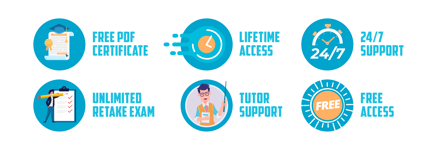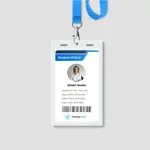Medical Secretary & Receptionist - Course
Spring Sale | 11 Free Courses + 12 PDF Certificate | Free Retake Exam | Lifetime Access
Training Tale
Summary
- Exam(s) / assessment(s) is included in price
- Tutor is available to students
Add to basket or enquire
Overview
A medical secretary is responsible for ensuring that a doctor’s office runs smoothly so that patients receive the best possible care. A medical secretary must understand office organisation and standard procedures to provide this secretarial support. They should also be able to use medical terminologies fluently. This Medical Secretary & Receptionist course will teach you about the medical secretarial profession and the skills needed to do the job successfully.
This course will teach you about the roles and responsibilities of a medical secretary. You will also learn various medical secretary skills, including an effective filing system, medical transcription, medical writing, maintaining medical records, an appointment system, and more. Furthermore, this comprehensive this course will teach you the critical concepts of patient confidentiality and other legal aspects of the healthcare industry.
Learning Outcomes
After completing this Medical Secretary & Receptionistcourse, learner will be able to:
- Understand the fundamentals of the National Health Service.
- Understand the roles and responsibilities of a medical secretary.
- Know how to organise schedules and manage appointment systems.
- Gain a clear understanding of the Law, Ethics and Medicine.
- Gain a thorough understanding of the effective filing system in medical offices.
- Familiarise yourself with the concept of patient confidentiality and its dos and don’ts.
- Become skilled at controlling and ordering stocks and supplies.
- Gain in-depth knowledge of Medical Terminology and Clinical Aspects.
- Know the importance of health and safety in the healthcare sector.
- Have a solid understanding of Complementary Medicine
Why Choose Medical Secretary & Receptionist Course from Us
- Self-paced course, access available from anywhere.
- Easy to understand, high-quality study materials.
- Medical Secretary & Receptionist Course developed by industry experts.
- MCQ quiz after each module to assess your learning.
- Automated and instant assessment results.
- 24/7 support via live chat, phone call or email.
- Free PDF certificate as soon as completing Medical Secretary & Receptionist course.
Assessment Method
After completing each module of the Medical Secretary & Receptionist, you will find automated MCQ quizzes. To unlock the next module, you need to complete the quiz task and get at least 60% marks. Once you complete all the modules in this manner, you will be qualified to request your certification.
Certification
After completing the MCQ/Assignment assessment for Medical Secretary & Receptionist course, you will be entitled to a Certificate of Completion from Training Tale. It will act as proof of your extensive professional development. The certificate is in PDF format, which is completely free to download. A printed version is also available upon request. It will also be sent to you through a courier for £13.99.
Course media
Description
[Bundle Course 1]
Detailed course curriculum of the Medical Secretary & Receptionist
Module 1: The National Health Service
- History
- Structure of the NHS
- The NHS Plan
- Resource Allocation
- Delivering Care
- Mental Health Services
- Public Health
- The NHS, the Regions and Devolution
Module 2: Patient (Customer) Care
- The Medical Receptionist
- Putting Patient First
- Complaints Within the Health Service
- The Complaints Procedure
- Patient and Public Involvement
- Patient’s Rights
- Access to Health Care
- Total Quality in Medical Practice
- Customer Care: Involving Patients and the Public
Module 3: Communication
- Report Writing
- Electronic Mail & Mobile Phones: Text Messages
- Telephone Skills
- People Skills – Face to Face
- Meeting
- Performance Review & Counselling
- The Practice Leaflet & Hospital Information Leaflets
- Networking
Module 4: Law, Ethics and Medicine
- Medical Ethics and Etiquette
- Doctor’s Duties
- Patient’s Right
- The Regulatory Bodies and Their Role
- Legal Aspects
- Certification
- Health and Safety at Work
Module 5: Health & Safety in a Clinical Environment
- First Aid at Work
- Hazardous Substances
- The NHS National Patient Safety Agency (NPSA)
- Hepatitis & AIDS
- Fire Precautions
- Clinical Risk Management
- Coping With Aggression & Violence
Module 6: Practical Reception Skills in General Practice
- Record Keeping and General Administration
- Information Technology
Module 7: The Hospital Service
- The Patient’s Route Through the Hospital
- Outpatient Appointments
- Admissions from the Waiting List
- Accident and Emergency Admissions
- Home From Hospital Support
- Day Cases and Ward Attendees
- Hospital Team
- Clinical Audit
- Star Ratings
- What is a Medical Record?
- Cases Notes
- Master Index
- Filing Room or Records Library
- Medical Records Procedure for Departments
- Retention of Records
- Destruction of Medical Records
- The Role of the Secretary in the Hospital
Module 8: Private Medicine
- Private Clinic or Hospital
- The Secretary In Private Practice
Module 9: Forms, Fees and Finances in General Practises
- Contracting
- Finance
- Practice Income
- Scotland
- Wales
- Northern Ireland
Module 10: Using Information Technology
- Computers in General Practice
- Electronic Medicine
- Computers in Hospitals
- Maintaining Security
Module 11: Medical Terminology and Clinical Aspects
- Pathology and X-ray Examinations
- Prescribing and Drugs
- Nurse Prescribing
- New Developments in Pharmacy
Module 12: Audit, Health Economics and Ensuring Quality for the Medical Receptionist and Secretary
- Audit
- Health Economics and Cost-effective Medicine
- Private Finance Initiative
- Clinical Governance
- National Institute for Clinical Excellence (NICE)
- National Clinical Assessment Service (NCAS)
- National Service Framework (NSF)
- Patient Surveys
Module 13: Complementary Medicine
- Acupuncture
- Alexander Technique
- Aromatherapy
- Chiropractic
- Homoeopathy
- Hydrotherapy
- Hypnotherapy
- Osteopathy
- Reflexology
[Bundle Course 2]
Dealing With Difficult People
- Module 01: Difficult People and Their Difficult Behaviour
- Module 02: Communicating With Difficult People
- Module 03: Standing Up to Difficult People
- Module 04: A Quick Guide to the Seven Classically Difficult Types
- Module 05: Dealing with Bosses Who Drive You Barmy
- Module 06: Colleagues to Throttle
- Module 07: Dealing With Impossible People
- Module 08: The Temper Tantrum Type
[Bundle Course 3]
Communication Skills Course
- Module 01: Introduction to Communication
- Module 02: The Communication Skills
- Module 03: Different Types of Communication
- Module 04: Different Methods of Communication
- Module 05: Styles of Communication
- Module 06: Barriers to Communication
- Module 07: Assessing Communication Competence: Relevant Criteria
- Module 08: Seven Actions for Effective Communication
- Module 09: Do’s and Don’ts of Effective Communication
[Bundle Course 4]
Level 4 Time Management Course
- Module 1: Basics of Time Management
- Module 2: Prioritise Your Time
- Module 3: Organise Your Time
- Module 4: Using Your Time Efficiently
- Module 5: Time Management in the Workplace
- Module 6: Time Management For Students
- Module 7: Time Management Software
- Module 8: Create a Value-Based Time Management Plan
[Bundle Course 5]
Level 5 Negotiation Skills Course
- Module 01: An Overview of Negotiation
- Module 02: How to Prepare For Negotiations
- Module 03: The Process of Negotiation
- Module 04: Ways of Developing Persuasion & Influencing Skills
- Module 05: Ways of Developing Communication Skills
- Module 06: How to Develop Active Listening Skills
- Module 07: Comprehending Body Language
- Module 08: Assertiveness and Self Confidence
- Module 09: Managing Anger
- Module 10: Managing Stress
- Module 11: Negotiation Tactics to Closing a Better Deal
- Module 12: Ways of Overcoming Sales Objections
[Bundle Course 6]
Level 5 Report Writing Course
- Module 01: Introduction to Report Writing
- Module 02: The Basics of Business Report Writing
- Module 03: The Practical Side of Report Writing (Part-1): Preparation & Planning
- Module 04: The Practical Side of Report Writing (Part-2): Collecting and Handling Information
- Module 05: The Practical Side of Report Writing (Part-3): Writing and Revising Report
- Module 06: The Creative Side of Report Writing (Part -1): A Style Guide to Good Report Writing
- Module 07: The Creative Side of Report Writing (Part -2): Improving the Presentation of Your Report
- Module 08: Developing Research Skills
- Module 09: Developing Creativity & Innovation
- Module 10: Develop Critical Thinking Skills
- Module 11: Interpersonal Skill Development
[Bundle Course 7]
Level 5 Proofreading & Copy Editing
- Module 01: An Overview of Proofreading
- Module 02: Use of the Style Guide
- Module 03: Spelling and Grammar
- Module 04: Paper-based Proofreading
- Module 05: On the Screen Proofreading
- Module 06: Basics of Copy Editing
- Module 07: Copy Editing – the Use of Language
- Module 08: Copy Editing – Checking Accuracy and Facts
- Module 09: Copy Editing – Legal Checks
- Module 10: Career Development
[Bundle Course 8]
Level 2 Customer Service
- Module 1: Introduction to Customer Service
- Module 2: Understanding the Organisation
- Module 3: Prepare to Deliver Excellent Customer Service
- Module 4: Communication in the Customer Service Role
- Module 5: Understand Customers
[Bundle Course 9]
Level 1 Certificate in Well-being
- Module 01: Introduction to Stress and Stress Management
- Module 02: Develop an Awareness of Mental Health
- Module 03: Develop an Awareness of Substance Misuse
- Module 04: Introductory Awareness of the Importance of Healthy Eating and Drinking for Adults
- Module 05: Dementia Awareness
[Bundle Course 10]
Level 3 Diploma in Healthcare Support
- Module 01: Promote Personal Development in Care Settings
- Module 02: Promote Safeguarding and Protection in Care Settings
- Module 03: Promote Health, Safety and Wellbeing in Care Settings
- Module 04: Understand Mental Well-Being and Mental Health Promotion
- Module 05: Causes and Spread of Infection
- Module 06: Promote Communication in Care Settings
- Module 07: Responsibilities of a Care Worker
- Module 08: Promote Effective Handling of Information in Care Settings
- Module 09: Understand Mental Health Problems
- Module 10: The Principles of Infection Prevention and Control
- And More...
[Bundle Course 11]
**Workplace Stress Management**
[Bundle Course 12]
**Anger Management**
Who is this course for?
This Medical Secretary & Receptionist course is ideal for Health Care Professionals who work and will be working in healthcare settings such as hospitals, clinics, and healthcare facilities.
Requirements
Students who intend to enrol in this course must meet the following requirements:
- Good command of the English language
- Must be vivacious and self-driven
- Basic computer knowledge
- A minimum of 16 years of age is required
Career path
After completing Medical Secretary & Receptionist, you will have developed a set of skills necessary for career advancement and will be able to pursue a variety of job opportunities—
- Medical Receptionist & Secretary
- Healthcare Administrator
- GP Receptionist
- Patient Coordinator
In the United Kingdom, these job opportunities pay between £10,000 and £30,000 per year.
Questions and answers
Currently there are no Q&As for this course. Be the first to ask a question.
Reviews
Currently there are no reviews for this course. Be the first to leave a review.
Legal information
This course is advertised on reed.co.uk by the Course Provider, whose terms and conditions apply. Purchases are made directly from the Course Provider, and as such, content and materials are supplied by the Course Provider directly. Reed is acting as agent and not reseller in relation to this course. Reed's only responsibility is to facilitate your payment for the course. It is your responsibility to review and agree to the Course Provider's terms and conditions and satisfy yourself as to the suitability of the course you intend to purchase. Reed will not have any responsibility for the content of the course and/or associated materials.






